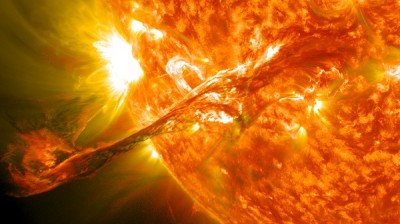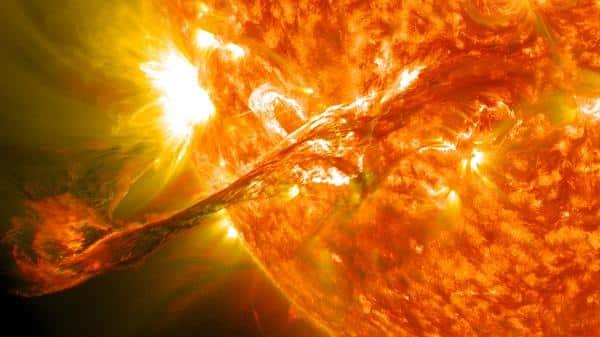
“My space weather colleagues believe that until we have an event that slams Earth and causes complete mayhem, policymakers are not going to pay attention,” Dr. Daniel Baker said. “The message we are trying to convey is that we made direct measurements of the 2012 event and saw the full consequences without going through a direct hit on our planet.”
Baker gave a presentation on the subject at the American Geophysical Union in San Francisco earlier this month. He is the director of the University of Colorado Laboratory of Atmospheric and Space Physics.
As previously reported by Off The Grid News, the power grid likely would not survive a direct hit by what scientists call a coronal mass ejection, or CME. America was hit once by such a CME, although it took place in 1859, before electricity lines stretched across the nation. Called the Carrington Event, the CME that year lit up the night sky from the North Pole to Central America, and some New Englanders even read their newspapers outside, as if it was daytime. More significantly, it took out telegraph machines – the most advanced technology of the time.
Baker and his colleagues say the 2012 CME was even more powerful than the 1859 one.
Harness the power of the sun when the power goes out…
“Had it hit Earth, the July 2012 event likely would have created a technological disaster by short-circuiting satellites, power grids, ground communication equipment and even threatening the health of astronauts and aircraft crews,” Baker said.
A Royal Academy of Engineering report released earlier this year urged UK officials to create a space weather board to enhance “solar superstorm” planning. The same entity also called for a space weather warning system that would alert the public about potentially dangerous radiation spawned by such events. The report further said:
These environmental challenges [solar flares] can cause detrimental effects to the electricity grid, satellites, avionics, air passengers, signals from satellite navigation systems, mobile telephones and more. They have consequently been identified as a risk to the world economy and society.
A National Resource Council report Dr. Baker co-authored in 2008 stated that high-energy particles released by a massive solar flare would possibly disrupt communications, the economy, and transportation. The Colorado scientists also accurately noted that the food supply would become limited rather quickly, along with limited to no access to medications and clean drinking water. It further read:
“The adverse effects of extreme space weather on modern technology–power grid outages, high-frequency communication blackouts, spacecraft anomalies–are well known and well documented, and the physical processes underlying space weather are also generally well understood. Less well documented and understood, however, are the potential economic and societal impacts of the disruption of critical technological systems by severe space weather.”
As previously noted by Off The Grid News, the SHIELD Act was introduced by US Representative Trent Franks to help bolster the power grid and prevent a power grid disaster in the wake of something like a CME. But the legislation has been stalled in Congress for years, prompting Franks to pen a new version of the bi-partisan supported bill to spur increased attention and hopefully movement on the pending bill.
Baker further said of the 2012 event:
The speed of this event was as fast or faster than anything that has been seen in the modern space age. The event not only had the most powerful CME ever recorded, but it would have triggered one of the strongest geomagnetic storms and the highest density of particle fluctuation ever seen in a typical solar cycle, which lasts roughly 11 year. The Carrington storm and the 2012 event show that extreme space weather events can happen even during a modest solar cycle like the one presently underway. Rather than wait and pick up the pieces, we ought to take lessons from these events to prepare ourselves for inevitable future solar storms.
Sign up for Off The Grid News’ weekly email and stay informed about the issues important to you
